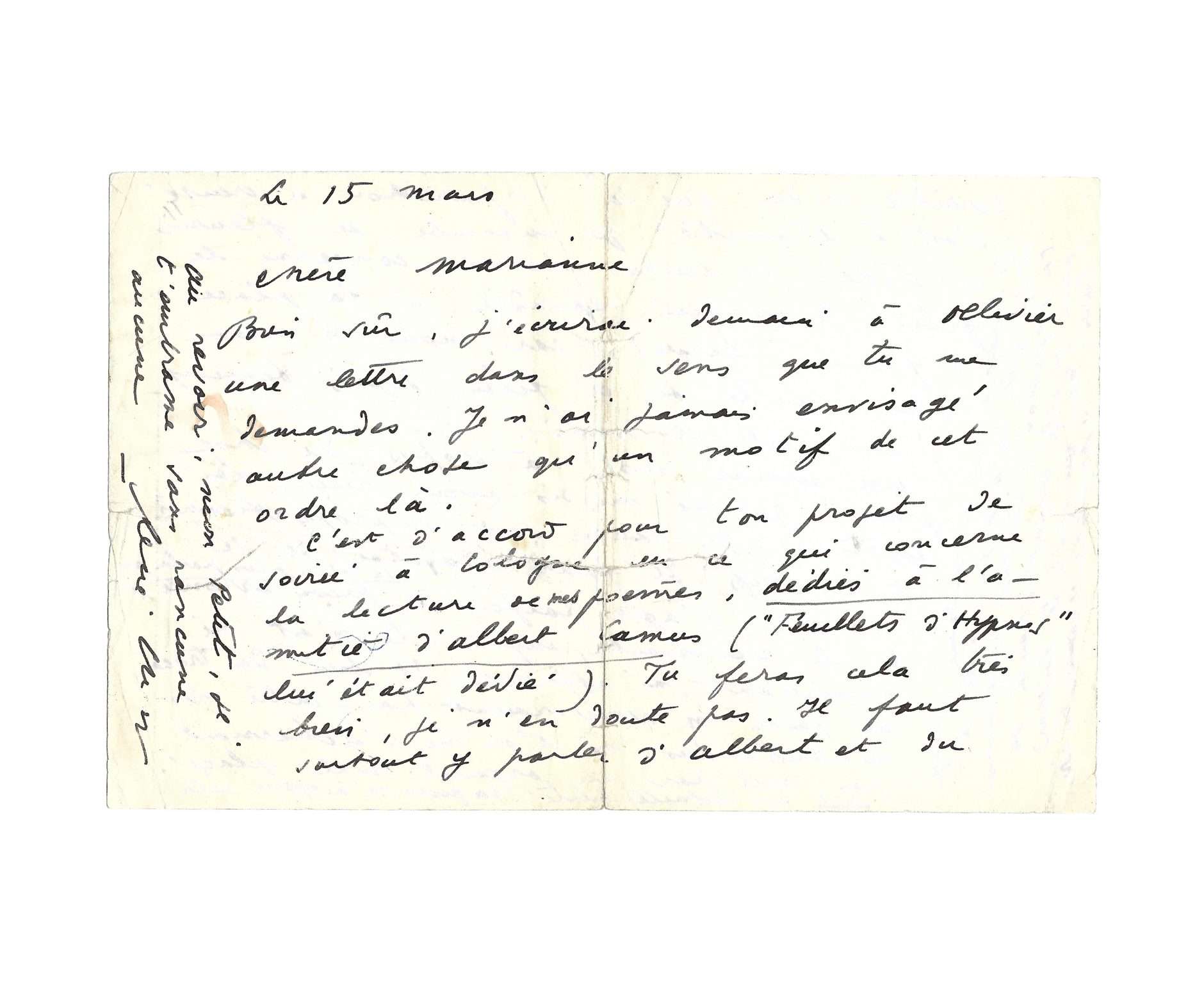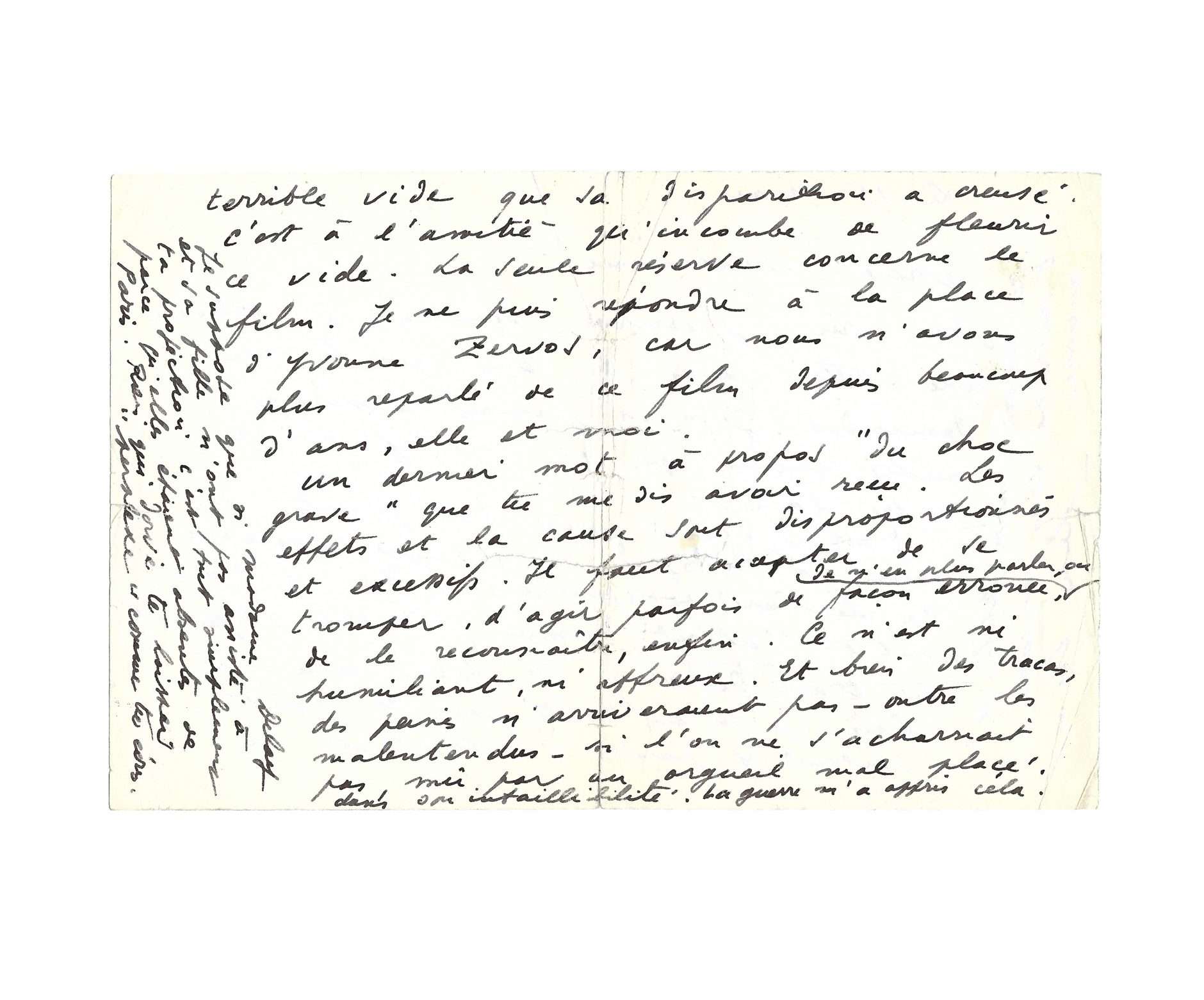[CAMUS] CHAR, René (1907-1988)
Autograph letter signed « René Char » to Marianne Oswald
N.p, 15th March, 2 p. in-8°
« Above all, we must talk about Albert and the abyssal emptiness that his disappearance caused. It is up to friendship to bloom this void »
Fact sheet
[CAMUS] CHAR, René (1907-1988)
Autograph letter signed « René Char » to Marianne Oswald
N.p, 15th March, 2 p. in-8°
Fold marks, central and margin tears without affecting the reading, spots
Moving letter from René Char evoking, among other things, the memory of his friend Albert Camus on the occasion of a reading of his poems
« Bien sûr, j’écrirai demain à Oliver une lettre dans le sens que tu me demandes. Je n’ai jamais envisagé autre chose qu’un motif de cet ordre là.
C’est d’accord pour ton projet de soirée à Cologne en ce qui concerne la lecture de mes poèmes, dédiés à l’amitié d’Albert Camus (“Feuillets d’Hypnos” lui était dédié). Tu feras cela très bien, je n’en doute pas. Il faut surtout y parler d’Albert et du terrible vide que sa disparition a creusé. C’est à l’amitié qu’incombe de fleurir ce vide. La seule réserve concerne le film. Je ne puis répondre à la place d’Yvonne Zervos, car nous n’avons plus reparlé de ce film depuis beaucoup d’ans, elle est moi.
Un dernier mot à propos “du choc grave” que tu me dis avoir reçu. Les effets et la cause sont disproportionnés et excessifs. Il faut accepter de se tromper, d’agir parfois de façon erroné, de n’en plus parler, ou de le reconnaître, enfin. Ce n’est ni humiliant, ni affreux. Et bien des traces, des peines n’arriveraient pas – outre les malentendus – si l’on ne s’acharnait pas même par un orgueil mal placé dans son infaillibilité. La guerre m’a appris cela.
Je suppose que si madame [Florence] Delay et sa fille n’ont pas assisté à ta projection c’est tout simplement parce qu’elles étaient absentes de Paris. Rien qui doive te laisser “perplexe” comme tu écris.
Au revoir, mon petit, je t’embrasse sans rancune aucune.
René Char »
René Char and Albert Camus maintained a deep friendship, the ultimate seal of these two paths crossed at the end of the war with their similarities and differences.
In 1946, then reader at Gallimard, Camus published the Feuillets d’Hypnos of Char. In 1947, Char in turn read Camus, and described La Peste as a “great book“. The poet writes that “children will be able to grow again, chimeras breathe“, the novelist replies that he is “the only poet today who has dared to defend beauty, to say it explicitly, to prove that one can fight for it at the same time as for everyday bread“. The two authors, who have already come closer, acquire a great notoriety.
In 1949, they exchanged on love, indulged in some more intimate confidences. Gradually, they drift towards a true spiritual and moral sharing. The admiration was reciprocal: Camus wrote to him in 1956 that “Before [he] knew [him], [he] did without poetry“; Char praised his talent in Le Figaro in 1957, after his friend won the Nobel Prize in Literature. This was followed by a dense correspondence, which ended the day before Camus’ death on 4 January 1960. In our letter, Char evokes the “abyssal emptiness” he feels after the sad end of his friend in a car accident.
Marianne OSWALD (1901-1985), singer and actress, friend of poets, was a remarkable storyteller; she collaborated on his radio and television programs devoted to poetry.



